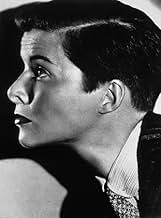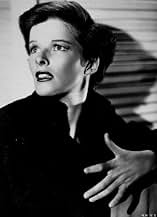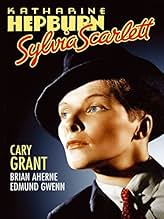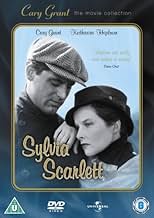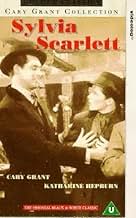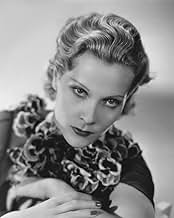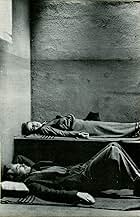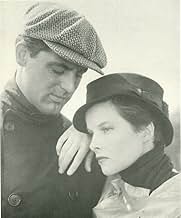Sylvia Scarlett
- 1935
- Tous publics
- 1h 35m
IMDb RATING
6.2/10
4.7K
YOUR RATING
When her father decides to flee to England, young Sylvia Scarlett must become Sylvester Scarlett and protect her father every step of the way, with the questionable help of plenty others.When her father decides to flee to England, young Sylvia Scarlett must become Sylvester Scarlett and protect her father every step of the way, with the questionable help of plenty others.When her father decides to flee to England, young Sylvia Scarlett must become Sylvester Scarlett and protect her father every step of the way, with the questionable help of plenty others.
- Awards
- 1 win total
Robert Adair
- Turnkey
- (uncredited)
Bunny Beatty
- Maid
- (uncredited)
May Beatty
- Older Woman on Ship
- (uncredited)
Daisy Belmore
- Fat Woman on Beach
- (uncredited)
Carmen Beretta
- Woman
- (uncredited)
Nina Borget
- Minor Role
- (uncredited)
Thomas Braidon
- Minor Role
- (uncredited)
Elsa Buchanan
- Minor Role
- (uncredited)
Colin Campbell
- Minor Role
- (uncredited)
James Carlisle
- Park Scam Onlooker
- (uncredited)
Patricia Caron
- Minor Role
- (uncredited)
Harold Cheevers
- Bobby
- (uncredited)
E.E. Clive
- Customs Inspector
- (uncredited)
Edward Cooper
- Customs Inspector
- (uncredited)
Featured reviews
You can't really love this picture, to be honest, though I really do want to love anything with Hepburn. In fact, this was the first time I ever caught myself thinking she'd put in a second-rate performance, but that's arguable - some will say that her boyishness actually was well done, and I can't entirely disagree with that.
The truth is that this movie is bursting with melodramatic affectation, and that is rather off-putting to us who are so used to the post-Brando state of character representation. We have to believe that the actor IS the character for the whole thing (writing, characterization, acting, everything) to be a success. If we are embarrassed by what we perceive as a bad performance, the whole thing's in danger of being embarrassing. Now I am no expert on 30s cinema, but I have seen a lot of this kind of thing originating from that decade and I kind of reckon it was the expected style of performance, still left-over from the silent days when body language was all a performer had. Knowing what Hepburn would be capable of bringing later, I think it can't be that she relied on the melodrama like a crutch - instead it's my feeling that she was too easily by Cukor's direction, since many of the other cast members act similarly.
The script is also weak, as it relies on the audience using their imagination far too much in order to fill in the gaps we assume exist in the novel. A good writer/director team will indicate passage of time more fluidly than this; we are left with a lurching sensation, like weeks or months have passed for the characters but not for us, and some might even be confused by the sudden shift of action. If it hadn't been for this clumsiness, I would have given the picture another star for scope.
The film gets the five stars I gave it for Cary Grant's performance, which is one of the best of his career, a superb, well rounded job, and of course it is good enough to deserve a recommendation for the film, even if everything else about it was not-so-good.
The truth is that this movie is bursting with melodramatic affectation, and that is rather off-putting to us who are so used to the post-Brando state of character representation. We have to believe that the actor IS the character for the whole thing (writing, characterization, acting, everything) to be a success. If we are embarrassed by what we perceive as a bad performance, the whole thing's in danger of being embarrassing. Now I am no expert on 30s cinema, but I have seen a lot of this kind of thing originating from that decade and I kind of reckon it was the expected style of performance, still left-over from the silent days when body language was all a performer had. Knowing what Hepburn would be capable of bringing later, I think it can't be that she relied on the melodrama like a crutch - instead it's my feeling that she was too easily by Cukor's direction, since many of the other cast members act similarly.
The script is also weak, as it relies on the audience using their imagination far too much in order to fill in the gaps we assume exist in the novel. A good writer/director team will indicate passage of time more fluidly than this; we are left with a lurching sensation, like weeks or months have passed for the characters but not for us, and some might even be confused by the sudden shift of action. If it hadn't been for this clumsiness, I would have given the picture another star for scope.
The film gets the five stars I gave it for Cary Grant's performance, which is one of the best of his career, a superb, well rounded job, and of course it is good enough to deserve a recommendation for the film, even if everything else about it was not-so-good.
SYLVIA SCARLETT (RKO Radio, 1935/released early January 1936), directed by George Cukor, and starring Katharine Hepburn, Cary Grant and Brian Aherne, is a movie that was somewhat ahead of its time. In the early 1970s during the so-called "nostalgia boom" era, I kept hearing about this being the worst Katharine Hepburn movie ever made. Because of that reputation, I became curious. Could it really be that bad? In a TV documentary about classic movies I saw many years ago, Hepburn was interviewed and said the majority of the theater patrons walked out long before the movie was over. Today it has gained a reputation as a "camp classic." Well, I finally got to watch this curious item for the first time on public television's WNET, Channel 13, in New York City in 1977 as part of the Katharine Hepburn Film Festival, which aired every Saturday night. After watching it, I kept wondering if this was supposed to be a comedy or drama. I guess a combination of both.
As for the plot, which opens in Paris, Henry Scarlett (Edmund Gwenn) commits larceny and takes off aboard ship with his daughter, Sylvia (Hepburn). To put the authorities off the track, she decides to cut her long hair and accompany him disguised as Scarlett's son, "Sylvester." They later meet up with a fast-talking swindler named Jimmy Monkley (Cary Grant) and travel with him around England like gypsies, making some easy money by cheating the public. Later, Sylvia, still disguised as Sylvester, encounters Michael Fane (Brian Aherne), an artist, and becomes interested in him, to later abandon her disguise to win him over.
Of the entire cast, Cary Grant comes off best in a very offbeat role, cockney accent and all, thus stealing every scene he's in. He even gets the closing shot sitting in a train compartment laughing himself silly after looking out the window and seeing Sylvia running off with Michael. Also in the cast are Natalie Paley as Lily, a Russian adventuress who tries to nab Henry Scarlett for herself, causing tragedy for him; and Dennie Moore as a daffy servant girl.
In spite of its reputation, SYLVIA SCARLETT is more interesting to see today because of the premise of a woman masquerading as a man/boy which pre-dates the more recent, VICTOR/VICTORIA (1982) with Julie Andrews. But let's not forget the 1933 MGM drama, QUEEN Christina in which Greta Garbo's character is mistaken for a young lad by an ambassador from Spain (John Gilbert), but at least that masquerade didn't go on for the entire movie. Unfortunately, Hepburn's version is an idea that might have looked good on paper, but not on screen. She does make a convincing boy, so to speak, in spite of her height, but I wonder how she felt about it years after it was made. A box office bomb at the time of its release, Hepburn and Grant did get to work together in screen again in three more comedies, BRINGING UP BABY (RKO, 1938), HOLIDAY (Columbia, 1938) and THE PHILADELPHIA STORY (MGM, 1940). SYLVIA SCARLETT, which formerly played on American Movie Classics prior to 2000, can be seen on Turner Classic Movies, or as a video/DVD rental. (**1/2)
As for the plot, which opens in Paris, Henry Scarlett (Edmund Gwenn) commits larceny and takes off aboard ship with his daughter, Sylvia (Hepburn). To put the authorities off the track, she decides to cut her long hair and accompany him disguised as Scarlett's son, "Sylvester." They later meet up with a fast-talking swindler named Jimmy Monkley (Cary Grant) and travel with him around England like gypsies, making some easy money by cheating the public. Later, Sylvia, still disguised as Sylvester, encounters Michael Fane (Brian Aherne), an artist, and becomes interested in him, to later abandon her disguise to win him over.
Of the entire cast, Cary Grant comes off best in a very offbeat role, cockney accent and all, thus stealing every scene he's in. He even gets the closing shot sitting in a train compartment laughing himself silly after looking out the window and seeing Sylvia running off with Michael. Also in the cast are Natalie Paley as Lily, a Russian adventuress who tries to nab Henry Scarlett for herself, causing tragedy for him; and Dennie Moore as a daffy servant girl.
In spite of its reputation, SYLVIA SCARLETT is more interesting to see today because of the premise of a woman masquerading as a man/boy which pre-dates the more recent, VICTOR/VICTORIA (1982) with Julie Andrews. But let's not forget the 1933 MGM drama, QUEEN Christina in which Greta Garbo's character is mistaken for a young lad by an ambassador from Spain (John Gilbert), but at least that masquerade didn't go on for the entire movie. Unfortunately, Hepburn's version is an idea that might have looked good on paper, but not on screen. She does make a convincing boy, so to speak, in spite of her height, but I wonder how she felt about it years after it was made. A box office bomb at the time of its release, Hepburn and Grant did get to work together in screen again in three more comedies, BRINGING UP BABY (RKO, 1938), HOLIDAY (Columbia, 1938) and THE PHILADELPHIA STORY (MGM, 1940). SYLVIA SCARLETT, which formerly played on American Movie Classics prior to 2000, can be seen on Turner Classic Movies, or as a video/DVD rental. (**1/2)
Androgeny is a quality that some of the biggest of our great stars possessed: Garbo, Dietrich, Grant, Vanessa Redgrave, to name a few, and of course, Katharine Hepburn. In "Sylvia Scarlett," she plays a young woman masquerading as a young man for part of this rather strange film that can't make up its mind what it is. The movie also stars Cary Grant, Edmund Gwenn and Brian Aherne. Gwenn is Henry Scarlett, an embezzler who has to high-tail it out of England fast. When his daughter Sylvia insists on going along, he tells her everyone will be looking for him with his daughter, so Sylvia becomes Sylvester by cutting his hair and donning mens' clothes.
On the boat, the two meet Jimmy Monckley, a con man, and eventually team up with him for a series of cons. Then a flirtatious maid friend of Jimmy's joins them and they become vaudevillians in one of the film's more bizarre twists. Henry, a widower, marries said maid and winds up obsessive and jealous (with, one suspects, good reason since she makes a pass at Sylvia as Sylvester). One night at a performance, the cast meets an artist, Michael Fane, whom Sylvia falls for, and she ultimately reveals himself to him as a woman.
The plot of this film changes more than the sexes, with Hepburn inexplicably staying a boy once she and her father have made their escape to France. There are some great scenes - the con in the French park, with Sylvia pretending to be a destitute boy who can't speak English, and the scene where the dress she stole on the beach so she could make her big reveal to Michael is recognized by the owner. Also, the act they perform is amusing. It probably would have been better to stick with the con angle and have the script go from there, but it goes from that to the performance angle to a love triangle etc.
Katharine Hepburn makes both an excellent boy and young woman in the throes of first love, and Cary Grant has an early, uncharacteristic role as an absolute thief and heel who is also somewhat abusive. His persona would change, and he would find it difficult to convince anyone later on to let him go back to this type of character who is not redeemed at the end. But his good looks and charm make him a natural rogue. The underrated Brian Aherne, who it appears wound up taking a back seat to Errol Flynn, is marvelous as Michael. He's romantic, sexy, and gives the role a light touch.
Directed by George Cukor, "Sulvia Scarlett" is a dizzy film that's not a wild comedy (which it probably should have been) or a drama or a love story. It's remembered today for Hepburn's cross-dressing. A shame, because it could have been remembered for more than that.
On the boat, the two meet Jimmy Monckley, a con man, and eventually team up with him for a series of cons. Then a flirtatious maid friend of Jimmy's joins them and they become vaudevillians in one of the film's more bizarre twists. Henry, a widower, marries said maid and winds up obsessive and jealous (with, one suspects, good reason since she makes a pass at Sylvia as Sylvester). One night at a performance, the cast meets an artist, Michael Fane, whom Sylvia falls for, and she ultimately reveals himself to him as a woman.
The plot of this film changes more than the sexes, with Hepburn inexplicably staying a boy once she and her father have made their escape to France. There are some great scenes - the con in the French park, with Sylvia pretending to be a destitute boy who can't speak English, and the scene where the dress she stole on the beach so she could make her big reveal to Michael is recognized by the owner. Also, the act they perform is amusing. It probably would have been better to stick with the con angle and have the script go from there, but it goes from that to the performance angle to a love triangle etc.
Katharine Hepburn makes both an excellent boy and young woman in the throes of first love, and Cary Grant has an early, uncharacteristic role as an absolute thief and heel who is also somewhat abusive. His persona would change, and he would find it difficult to convince anyone later on to let him go back to this type of character who is not redeemed at the end. But his good looks and charm make him a natural rogue. The underrated Brian Aherne, who it appears wound up taking a back seat to Errol Flynn, is marvelous as Michael. He's romantic, sexy, and gives the role a light touch.
Directed by George Cukor, "Sulvia Scarlett" is a dizzy film that's not a wild comedy (which it probably should have been) or a drama or a love story. It's remembered today for Hepburn's cross-dressing. A shame, because it could have been remembered for more than that.
There seem to be some very common unfortunate negative feelings about this film ("SS"), which I think are mostly a clash of expectations with execution. The film presents two great stars in unexpected roles with unexpectedly complicated characters and quirky humor.
This is an interesting platform for Hepburn's developing style, moving her from relatively straightforward "strong female" roles (Christopher Strong, The Little Minister 1932-1934) to more multifaceted personas where Hepburn has to interact more with her femininity (Alice Adams, Quality Street 1935-1937). Sylvia's concern with her sexuality is very disconcertingly captured by the alternatingly coquettish and belligerent Hepburn.
Cary Grant's role in SS is a dark type he didn't get to do often enough, but excelled at. Grant has in this movie a truly unredeemable side that can't be whitewashed by just putting on nice clothes or changing his accent--a side he perfected in None But The Lonely Heart.
The movie also has great virtue as a cultural island in rather intolerant times. The faint undertones of male (Sylvester and Michael Fane) and female (Sylvia and Maudie and Lily) homosexuality are subtle and effectively done, and of course the transvestitism is diverting: the scene where Hepburn meets the owner of her dress is a classic.
Overall, the humor and characterizations in SS are pointed in so many directions that it's hard to figure out whether the movie is deep or ditzy. I have my doubts--the change from con-men to vaudevillians would be hilarious if it weren't so bizarre--but I vote for the former. This movie deserves its place beside Bringing Up Baby, Holiday and The Philadelphia Story as an enduring work of the Hepburn/Grant collaboration.
This is an interesting platform for Hepburn's developing style, moving her from relatively straightforward "strong female" roles (Christopher Strong, The Little Minister 1932-1934) to more multifaceted personas where Hepburn has to interact more with her femininity (Alice Adams, Quality Street 1935-1937). Sylvia's concern with her sexuality is very disconcertingly captured by the alternatingly coquettish and belligerent Hepburn.
Cary Grant's role in SS is a dark type he didn't get to do often enough, but excelled at. Grant has in this movie a truly unredeemable side that can't be whitewashed by just putting on nice clothes or changing his accent--a side he perfected in None But The Lonely Heart.
The movie also has great virtue as a cultural island in rather intolerant times. The faint undertones of male (Sylvester and Michael Fane) and female (Sylvia and Maudie and Lily) homosexuality are subtle and effectively done, and of course the transvestitism is diverting: the scene where Hepburn meets the owner of her dress is a classic.
Overall, the humor and characterizations in SS are pointed in so many directions that it's hard to figure out whether the movie is deep or ditzy. I have my doubts--the change from con-men to vaudevillians would be hilarious if it weren't so bizarre--but I vote for the former. This movie deserves its place beside Bringing Up Baby, Holiday and The Philadelphia Story as an enduring work of the Hepburn/Grant collaboration.
What a waste of talent due to a muddled script and some limp direction from George Cukor. Here we have KATHARINE HEPBURN (playing a boy, Sylvester, long before Streisand played Yentl!), CARY GRANT as a strolling player with a Cockney accent and BRIAN AHERNE as an unbelievably gullible artist bewitched by Hepburn.
None of the stars are at their peak here, perhaps unable to rise above a mediocre and baffling script. Hepburn, even with her slim frame and narrow face, never is believable as a young man and the masquerade is something we're forced to believe could have happened.
EDMUND GWENN is her n'er-do-well father who has to take to the road after he's accused of a crime, and Hepburn assumes a disguise as a boy so as to avoid capture. They join a traveling road show with CARY GRANT in charge, and from then on the plot takes a series of twists and turns involving BRIAN AHERNE and his eventual interest in Sylvia when she assumes her female counterpart. It's a cross-dressing tale best forgotten if you want to keep remembering Hepburn as a legendary star.
CARY GRANT is the only one who comes off at least believable in his Cockney role, but no one is really given material worthy of their talent and George Cukor has been unable to make anything out of the awkward script. Hepburn is simply embarrassing to watch.
Summing up: This offbeat comedy was obviously intended to be a charming romp for its three stars rather than the box-office flop that it was, to the extent that Hepburn was labeled "box-office poison" on the strength of this particular film.
A look at this film must have convinced David O. Selznick why Hepburn was never seriously considered for Scarlett O'Hara.
None of the stars are at their peak here, perhaps unable to rise above a mediocre and baffling script. Hepburn, even with her slim frame and narrow face, never is believable as a young man and the masquerade is something we're forced to believe could have happened.
EDMUND GWENN is her n'er-do-well father who has to take to the road after he's accused of a crime, and Hepburn assumes a disguise as a boy so as to avoid capture. They join a traveling road show with CARY GRANT in charge, and from then on the plot takes a series of twists and turns involving BRIAN AHERNE and his eventual interest in Sylvia when she assumes her female counterpart. It's a cross-dressing tale best forgotten if you want to keep remembering Hepburn as a legendary star.
CARY GRANT is the only one who comes off at least believable in his Cockney role, but no one is really given material worthy of their talent and George Cukor has been unable to make anything out of the awkward script. Hepburn is simply embarrassing to watch.
Summing up: This offbeat comedy was obviously intended to be a charming romp for its three stars rather than the box-office flop that it was, to the extent that Hepburn was labeled "box-office poison" on the strength of this particular film.
A look at this film must have convinced David O. Selznick why Hepburn was never seriously considered for Scarlett O'Hara.
Did you know
- TriviaAfter a disastrous preview, director George Cukor and Katharine Hepburn went to RKO producer Pandro S. Berman's home and offered their services for free for another film. Berman, who was furious at the quality of the movie, replied tersely, "Don't bother, please."
- GoofsWhen Sylvester yells for a cop outside the mansion, Henry gets left outside. Jimmy opens the door and pulls Henry in roughly. In doing so, Henry loses a shoe. Inside the mansion, Henry has both shoes, never having retrieved his shoe from outside.
- Quotes
Sylvia Scarlett: Well, we're all fools sometimes. Only you choose such awkward times.
- ConnectionsFeatured in The Men Who Made the Movies: George Cukor (1973)
- SoundtracksHello ! Hello ! Who's your Lady Friend ?
(uncredited)
Music by Harry Fragson
Lyrics by Worton David and Bert Lee (1914)
Sung by Cary Grant and Edmund Gwenn
- How long is Sylvia Scarlett?Powered by Alexa
Details
Box office
- Budget
- $641,000 (estimated)
- Runtime1 hour 35 minutes
- Color
- Aspect ratio
- 1.37 : 1
Contribute to this page
Suggest an edit or add missing content


